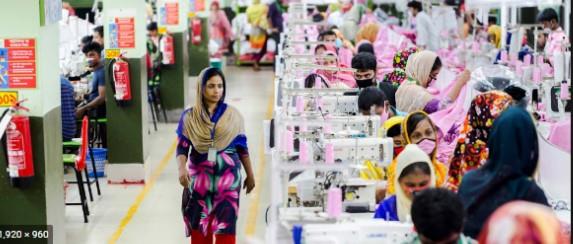
Strained Ties With India Make Bangladesh Export Garments Via Maldives, Not India
“Previously, Bangladeshi goods were shipped through Indian airports, but now they are rerouting shipments from other locations. This shift means India's airports and ports lose revenue previously earned from handling these cargoes,” Deepak Tiwari, managing director of MSC Agency (India) Pvt Ltd, toldMint over the phone. The Mediterranean Shipping Company (MSC) is a leading global container shipping company.
Bangladesh is rerouting its textile exports to the Maldives by sea and then dispatching cargoes by air to its global customers including H&M and Zara, the three people said.
ADVERTISEMENTThe redirection of textile exports could weaken trade relations between India and Bangladesh and reduce the collaborative opportunities in logistics and infrastructure projects. It could also potentially threaten India's revenue from port and transit fees, alongside business generated from Bangladesh's exports that pass through Indian borders.
Seized by the issue, the Indian government is exploring a balanced solution to ensure that Bangladesh's textile exports-significant in volume and linked to Indian manufacturing hubs in Bangladesh-remain beneficial to Indian interests, one person said.
“A significant portion of these Bangladeshi textile exports are being produced in facilities or factories owned or operated by Indian companies based in Bangladesh,” the first person said.
Bangladesh's textile industry contributes 80% of its exports and 13% of its GDP.
The issue is under the government's attention. We are currently reviewing its impact on India,” the second person said.
Industry experts suggested that Bangladesh took this step to gain greater control over its supply chain and meet its shipment deadlines by avoiding delays caused at India's airports.
“This new route offers Bangladesh a strategic advantage along with improved reliability, which is crucial for meeting tight deadlines in the international clothing market,” said Arun Kumar, president of the Association of Multimodal Transport Operators of India, an industry body advocating seamless, efficient transportation solutions across sea, rail and road networks in India.“Furthermore, by avoiding reliance on Indian ports, Bangladesh is ensuring greater control over its supply chain.”
Kumar explained that textiles are also treated as perishable goods and that failure to deliver them on time results in the rejection of consignments. Garments meant for a specific season lose their value if they are delivered late.
Indian textile exporters had a different perspective on the rerouting of exports by Bangladesh.
“There's nothing to read into this. Indian airports are already congested, and we had also requested the government to restrict Bangladeshi textiles from passing through Indian airports,” Anil Buchasia, executive member, eastern region, Apparel Export Promotion Council, toldMint over the phone.
The third person aware of the developments dismissed suggestions that the move was linked to the ouster in August of former Bangladesh prime minister Sheikh Hasina, who is currently said to be staying in India. The International Crimes Tribunal (Bangladesh) had issued an arrest warrant against her in October.
“The government does not see this as a reaction to Sheikh Hasina's asylum. Textiles are the backbone of Bangladesh's economy, so they must have made this decision to promote their textile exports,” the third person said.
Garment exports
Bangladesh's garment exports fell 4.34% to $44.47 billion in FY24, according to Bangladesh Bank. The decline was attributed primarily to reduced shipments of readymade garments, reflecting broader economic challenges.
Bangladesh's garment exports had surged 17% to $46.49 billion in FY23, up from $39.8 billion in FY22. The country was the third-largest exporter of clothing last year, following China and the European Union, and the sector accounted for over 80% of its total export earnings. In comparison, India's garment exports were less than half that size, placing the country in sixth position.
Queries emailed to the secretary and spokesperson of the ministry of commerce and industry and the High Commissions of Bangladesh and Maldives in India remained unanswered until publication time.
Maldives Airports Company Ltd offers a sea-to-air cargo transshipment service, which allows goods to be transported to the Maldives by sea and then flown to global destinations. Started in March 2024, the inaugural shipment consisted of garments from Bangladesh, which arrived in the Maldives by sea and were flown to Germany via Turkish Airlines in May, according to a media report.
Seven airlines – Qatar Airways, Emirates, Turkish Airlines, Aeroflot, Gulf Air, Neos Airlines, and Etihad Airways – were part of the transshipment network, the report said.
Bangladesh is the world's largest garment producer and a supplier to western brands such as H&M, Zara and Carrefour.
The neighbouring country is an important manufacturing hub and export destination for India, with annual cotton shipments to Dhaka reaching $1.86 billion out of total exports of $2.18 billion in FY24, according to commerce ministry data. India's total exports to Bangladesh in FY24 increased from $2 billion in FY23.
From April to September 2024, India's exports to Bangladesh totaled $1.25 billion, with cotton accounting for $1.11 billion. In the same period in FY24, exports were worth $912.62 million, with cotton making up $785.1 million.
END

Legal Disclaimer:
MENAFN provides the information “as is” without warranty of any kind. We do not accept any responsibility or liability for the accuracy, content, images, videos, licenses, completeness, legality, or reliability of the information contained in this article. If you have any complaints or copyright issues related to this article, kindly contact the provider above.
Most popular stories
Market Research

- Manuka Honey Market Report 2024, Industry Growth, Size, Share, Top Compan...
- Modular Kitchen Market 2024, Industry Growth, Share, Size, Key Players An...
- Acrylamide Production Cost Analysis Report: A Comprehensive Assessment Of...
- Fish Sauce Market 2024, Industry Trends, Growth, Demand And Analysis Repo...
- Australia Foreign Exchange Market Size, Growth, Industry Demand And Forec...
- Cold Pressed Oil Market Trends 2024, Leading Companies Share, Size And Fo...
- Pasta Sauce Market 2024, Industry Growth, Share, Size, Key Players Analys...





















Comments
No comment